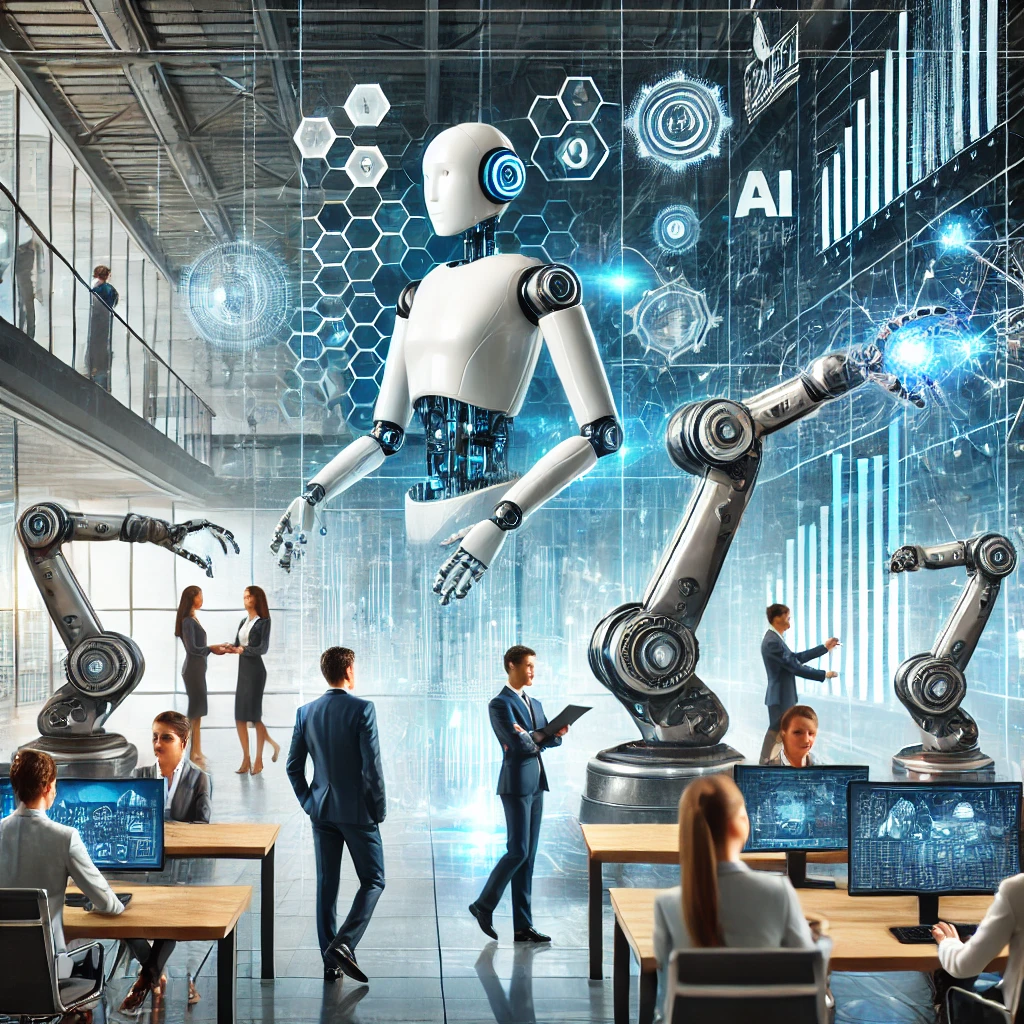The rapid advancement of artificial intelligence (AI) and automation technologies is reshaping the business landscape in profound ways. These innovations are not only streamlining operations but also redefining how work gets done across industries. As companies embrace AI-driven solutions, the future of work is taking on a new form—one that blends human ingenuity with machine efficiency.
This article explores how AI and automation are revolutionizing business operations, the benefits they offer, and the challenges they pose, providing valuable insights for businesses looking to stay competitive in an increasingly automated world.
How AI and Automation Are Transforming Business Operations
AI and automation are more than buzzwords; they are driving a paradigm shift in how businesses function. From automating repetitive tasks to enabling data-driven decision-making, these technologies are opening up new possibilities.
1. Streamlining Routine Tasks
Automation tools powered by AI are taking over mundane, time-consuming tasks such as data entry, invoice processing, and customer service inquiries. This allows employees to focus on higher-value activities that require creativity and critical thinking.
Example:
Chatbots and virtual assistants are now common in customer service, handling queries 24/7 with minimal human intervention. Companies like Amazon use AI to enhance customer interactions while reducing response times.
2. Enhancing Decision-Making
AI systems analyze vast amounts of data in real-time, uncovering insights that would be impossible for humans to detect. These insights help businesses make informed decisions quickly and effectively.
Example:
Retailers use AI algorithms to predict consumer trends, optimize pricing strategies, and personalize marketing campaigns, leading to increased sales and customer loyalty.
3. Revolutionizing Supply Chains
AI and automation are making supply chains more efficient by predicting demand, optimizing inventory levels, and improving logistics. Automated systems also minimize errors and enhance operational accuracy.
Example:
Logistics giants like FedEx and UPS leverage AI for route optimization and package tracking, ensuring timely deliveries while reducing fuel consumption.
The Benefits of AI and Automation in the Workplace
Adopting AI and automation offers a wide range of benefits that extend beyond operational efficiency. Here are some of the most significant advantages:
1. Increased Productivity
Automating repetitive tasks frees up employees’ time, enabling them to concentrate on strategic initiatives. This leads to higher productivity and improved job satisfaction.
2. Cost Savings
By automating processes, businesses can reduce labor costs and minimize human errors, which often lead to expensive mistakes.
3. Improved Customer Experience
AI-powered tools like chatbots and recommendation systems enhance the customer experience by providing quick, accurate, and personalized responses.
4. Data-Driven Insights
AI analytics help businesses identify trends, track performance metrics, and uncover new opportunities for growth.
5. Scalability
Automation allows businesses to scale operations without the need for proportional increases in workforce or resources.
Challenges and Concerns
While AI and automation bring significant benefits, they also come with challenges that businesses must address to ensure a smooth transition.
1. Workforce Displacement
One of the biggest concerns is the potential displacement of workers due to automation. Jobs that involve routine tasks are most at risk, prompting fears of unemployment and economic inequality.
2. High Implementation Costs
The upfront cost of adopting AI and automation technologies can be prohibitive, especially for small and medium-sized enterprises (SMEs).
3. Data Privacy and Security
As businesses rely more on AI, they must handle vast amounts of sensitive data, raising concerns about privacy and cybersecurity.
4. Skills Gap
The shift to AI-driven operations creates a demand for new skills. Businesses must invest in upskilling their workforce to remain competitive.
Industries Leading the Way
Several industries are at the forefront of integrating AI and automation into their operations. Here are a few examples:
1. Healthcare
AI is transforming healthcare by enabling faster and more accurate diagnoses, personalized treatment plans, and efficient administrative workflows.
Example:
AI algorithms analyze medical images to detect diseases like cancer with higher accuracy than traditional methods.
2. Manufacturing
Automation is revolutionizing manufacturing through robotics, predictive maintenance, and quality control.
Example:
Car manufacturers like Tesla use robots to assemble vehicles, increasing production speed and consistency.
3. Retail
Retailers leverage AI to personalize shopping experiences, manage inventory, and optimize supply chains.
Example:
Walmart uses AI to analyze customer data and predict demand, ensuring shelves are stocked with popular items.
4. Financial Services
AI is streamlining processes like fraud detection, credit scoring, and investment analysis in the financial sector.
Example:
Banks use machine learning algorithms to identify fraudulent transactions in real-time, protecting customers and reducing losses.
Preparing for the Future of Work
The future of work will be shaped by the seamless integration of AI and automation with human expertise. To thrive in this evolving landscape, businesses must take proactive steps:
1. Upskilling the Workforce
Invest in training programs to equip employees with the skills needed to work alongside AI systems. Focus on developing expertise in areas like data analysis, AI programming, and problem-solving.
2. Embracing a Hybrid Workforce
A hybrid workforce combines the strengths of humans and machines. Assign routine tasks to AI while leveraging human creativity and emotional intelligence for strategic roles.
3. Fostering a Culture of Innovation
Encourage employees to embrace change and experiment with new technologies. A culture that values innovation will be better equipped to adapt to advancements.
4. Ensuring Ethical AI Use
Adopt transparent and ethical practices when implementing AI. Prioritize data privacy, fairness, and accountability to build trust with customers and employees.
Conclusion
AI and automation are not just transforming business operations—they are shaping the very nature of work. By embracing these technologies, businesses can unlock unprecedented levels of efficiency, innovation, and growth. However, the journey requires careful planning, investment in skills development, and a commitment to ethical practices.
As the future of work continues to evolve, staying informed and adaptable will be key to success. For the latest insights and practical advice on AI, automation, and business trends, keep reading our website—your trusted source for news and tips on navigating the future of work.
